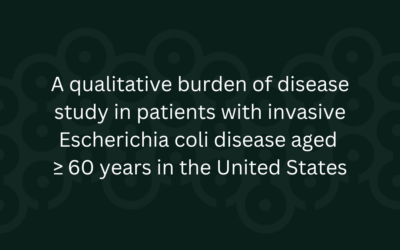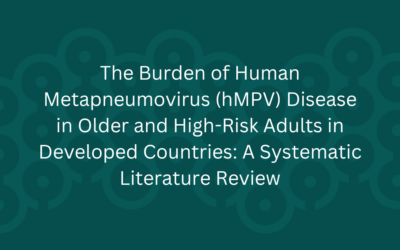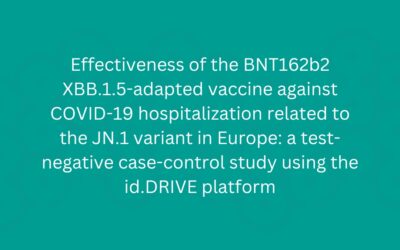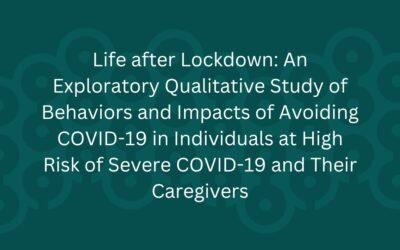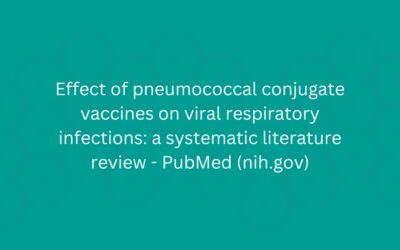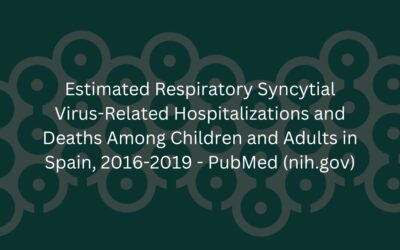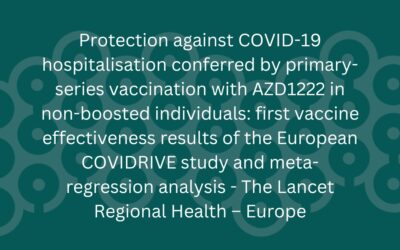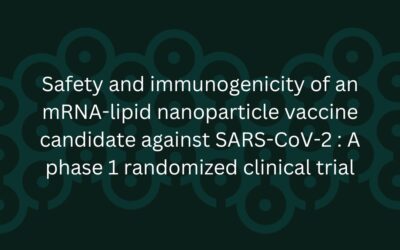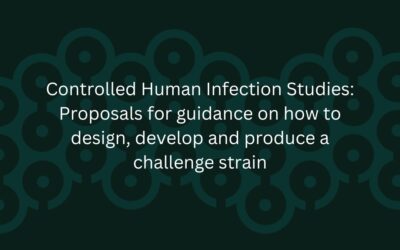Background Invasive Escherichia coli disease (IED) comprises a diverse range of severe infections caused by E. coli,...
Systematic Literature Review: Burden of hMPV in Older and High-Risk Adults in Developed Countries
Introduction Human metapneumovirus (hMPV) causes respiratory infections in individuals of all age groups. While the...
COVID-19 vaccine effectiveness study against JN.1 variant using id.DRIVE platform
Background Prior studies have reported lower effectiveness of XBB.1.5-adapted vaccines against hospitalization related...
Protocol development: Observational study EAGLE
Abstract Background: Immunocompromised individuals are known to respond inadequately to SARS-CoV-2 vaccines, placing...
Qualitative study on COVID-19 avoidance behavior after lockdown
Abstract Background: This exploratory qualitative study involved semi-structured interviews with adults and caregivers...
Systematic Literature Review: Effect of pneumococcal conjugate vaccines on viral respiratory infections
In addition to preventing pneumococcal disease, emerging evidence indicates that pneumococcal conjugate vaccines (PCVs) might indirectly reduce viral respiratory tract infections (RTIs) by affecting pneumococcal-viral interactions.
Symptomatic Respiratory Syncytial Virus Infection Incidence in Adults in Multiple Countries
Estimating respiratory syncytial virus (RSV) burden in adults is challenging because of non-specific symptoms, infrequent standard-of-care testing, resolution of viral shedding before seeking medical care, test positivity that varies by specimen site in the upper airway and lower diagnostic test sensitivity compared to children.
Respiratory Syncytial Virus-Related Hospitalizations and Deaths Among Children and Adults in Spain
Respiratory syncytial virus (RSV) causes a substantial disease burden among infants. In older children and adults, incidence is underestimated due to nonspecific symptoms and limited standard-of-care testing. We aimed to estimate RSV-attributable hospitalizations and deaths in Spain during 2016-2019.
Enabling the evaluation of COVID-19 vaccines with correlates of protection
In February 2023, a meeting about correlates of protection (CoPs) against COVID-19 was organized by the International Alliance for Biological Standardization, the European Plotkin Institute for Vaccinology, and Vaccinopolis. The meeting aimed at reviewing the evidence, drawing conclusions, and identifying knowledge gaps.
COVIDRIVE: AZD1222 vaccine effectiveness against hospitalisation
Vaccine effectiveness (VE) studies with long-term follow-up are needed to understand durability of protection against severe COVID-19 outcomes conferred by primary-series vaccination in individuals not receiving boosters. COVIDRIVE is a European public-private partnership evaluating brand-specific vaccine effectiveness (VE). We report a prespecified interim analysis of primary-series AZD1222 (ChAdOx1 nCoV-19) VE.
Lyme Disease Publications
P95 has collaborated in a large review study about Lyme disease. This study has involved databases/surveillance and systematic reviews focusing on Lyme disease incidence, epidemiology, hospitalization, and clinical manifestations, among other outcomes, in different regions of the World.
Phase 2b/3 trial HERALD: CVnCoV SARS-CoV-2 mRNA vaccine CANDIDATE
Additional safe and efficacious vaccines are needed to control the COVID-19 pandemic. We aimed to analyse the efficacy and safety of the CVnCoV SARS-CoV-2 mRNA vaccine candidate.
WHO global vaccine safety multi-country collaboration project on safety in pregnancy
Standardized case definitions strengthen post-marketing safety surveillance of new vaccines by improving generated data, interpretation and comparability across surveillance systems.
Safety and immunogenicity of an mRNA-lipid nanoparticle vaccine candidate against SARS-CoV-2 : A phase 1 randomized clinical trial
We used the RNActive® technology platform (CureVac N.V., Tübingen, Germany) to prepare CVnCoV, a COVID-19 vaccine containing sequence-optimized mRNA coding for a stabilized form of SARS-CoV‑2 spike (S) protein encapsulated in lipid nanoparticles (LNP).
Controlled Human Infection Studies: Proposals for guidance on how to design, develop and produce a challenge strain
There is an increasing need to establish quality principles for designing, developing and manufacturing challenge agents as currently these agents are classified differently by various jurisdictions.


